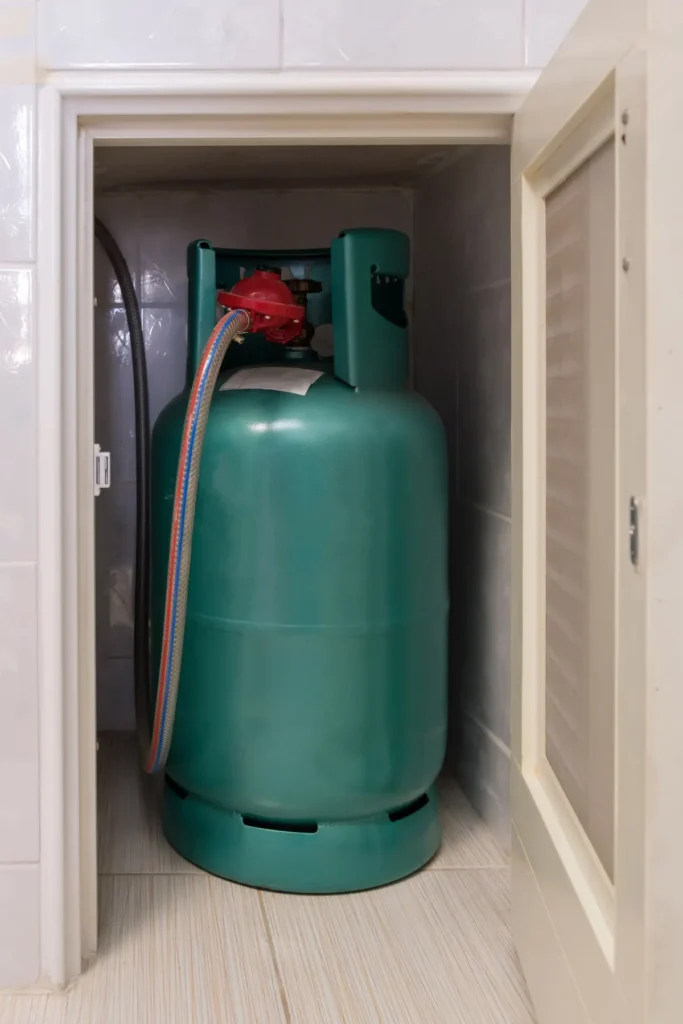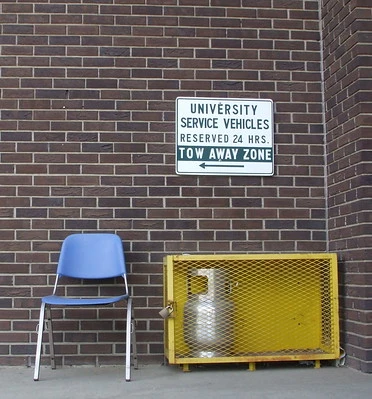
No, you shouldn’t put a propane tank in a regular cabinet. It’s not safe because propane is highly flammable. If there’s a leak, the gas can build up inside the cabinet, which can lead to a fire or explosion. Regular cabinets don’t have good ventilation, so any leaked gas can get trapped inside. Plus, cabinets can get warm, and heat can make propane tanks more dangerous.
However, you can use cabinets specifically designed for propane tanks. These cabinets have proper ventilation to prevent gas buildup and are made to keep the tank secure and cool. If you need to store a propane tank in a cabinet, make sure it’s one that’s made for that purpose.
But generally, it’s much safer to store propane tanks outside in a well-ventilated area like a shed or garage, away from direct sunlight and heat sources. Always keep the tank standing up to prevent leaks and ensure safety.
Risks of Storing a Propane Tank in a Cabinet
Storing a propane tank in a cabinet can pose several serious risks. One major concern is the potential for fire and explosion. Propane tanks can sometimes leak, and when gas builds up in an enclosed space like a cabinet, it can create a highly flammable and explosive situation.
Another problem is insufficient ventilation. Cabinets are often tightly sealed, which means that any leaked propane gas can accumulate quickly, leading to dangerous concentrations. This buildup of gas in an enclosed space increases the risk of a fire or explosion.

Additionally, there are accessibility issues to consider. In case of an emergency, it can be difficult to quickly access a propane tank stored inside a cabinet. This delay can be critical if there is a leak or other problem that needs immediate attention. Properly storing propane tanks in well-ventilated, accessible areas is crucial for safety.
Proper storage of propane tanks also involves ensuring they are kept in a stable, upright position to prevent leaks and potential damage. Cabinets may not provide the necessary stability, increasing the risk of the tank tipping over.
Moreover, cabinets are often made of materials that are not designed to withstand the harsh conditions that propane tanks might be exposed to, such as extreme temperatures or moisture. This can lead to rusting or other damage to the tank, further increasing the risk of leaks.
It’s also important to consider that storing a propane tank in a cabinet may violate local safety regulations and building codes. These regulations are in place to protect you and those around you from the dangers associated with improper storage.
When Storing Tanks, You Can Use Gas Cylinder Cage Cabinet Lockers
Proper storage of gas cylinders is crucial for ensuring safety and compliance with regulations. One effective solution for storing gas cylinders is the use of gas cylinder cage cabinet lockers. These storage solutions offer several benefits:
- Safety and Security:
- Protection from Theft and Vandalism: Gas cylinder cages and lockers are typically made from durable materials like steel, making them resistant to break-ins and damage.
- Controlled Access: These lockers often come with lockable doors, ensuring that only authorized personnel can access the cylinders, thereby preventing unauthorized use.
- Regulatory Compliance:
- OSHA Standards: In the United States, OSHA has specific requirements for the storage of compressed gas cylinders, including separation of full and empty cylinders, proper labeling, and secure storage to prevent tipping.
- Local Fire Codes: Many local fire codes also dictate how gas cylinders should be stored, and using approved cages and lockers helps in adhering to these regulations.
- Organization and Space Management:
- Efficient Use of Space: Gas cylinder lockers are designed to optimize storage space, allowing for vertical stacking and organized storage of multiple cylinders.
- Ease of Inventory Management: Clearly labeled compartments and organized storage make it easier to keep track of inventory and monitor usage.
- Safety Features:
- Ventilation: Proper ventilation is essential to prevent the buildup of gases in case of a leak. Most gas cylinder cages and lockers are designed with ventilation panels.
- Fire Resistance: Many storage lockers are constructed with materials that provide fire resistance, adding an extra layer of protection.
- Durability and Weather Resistance:
- Outdoor and Indoor Use: These storage solutions are suitable for both indoor and outdoor use, with weather-resistant coatings to protect against rust and corrosion.
- Longevity: Made from robust materials, gas cylinder lockers are built to last, providing long-term storage solutions.
Tips for Using Gas Cylinder Cage Cabinet Lockers
- Regular Inspections: Conduct routine inspections to ensure that the lockers are in good condition and that all safety features are functioning correctly.
- Proper Labeling: Clearly label each cylinder with its contents and status (full, empty, or in use) to avoid confusion and ensure safe handling.
- Training: Ensure that all personnel who handle gas cylinders are adequately trained in safe storage practices and emergency procedures.
By using gas cylinder cage cabinet lockers, you can enhance the safety, security, and organization of your gas cylinder storage, ensuring compliance with regulations and protection of your assets.
Alternatives to Cabinet Storage
Portable Storage Solutions
Portable storage solutions for propane tanks are specifically designed to provide safe and secure storage while allowing for easy mobility. These units typically feature reinforced construction with straps or clamps to hold the tank in place. For instance, a common portable storage solution might include a steel frame with dimensions of 24 inches in height, 16 inches in width, and 16 inches in depth. It can securely accommodate standard 20-pound propane tanks. These units often have ventilation openings to prevent gas buildup and can be easily transported using built-in handles or wheels.
Safety Cages and Lockers
Safety cages and lockers are robust enclosures made from heavy-duty materials such as steel mesh or expanded metal. These structures provide excellent ventilation and security. A typical safety cage might measure 48 inches in height, 30 inches in width, and 30 inches in depth, with a locking mechanism to prevent unauthorized access. The mesh size is usually around 1-inch to 2-inch squares to allow airflow while ensuring safety. These cages are ideal for both residential and commercial use, offering a secure and compliant way to store one or more propane tanks.
Utilizing Propane Tank Covers
Propane tank covers are designed to protect tanks from environmental elements while maintaining proper ventilation. These covers are usually made from UV-resistant, weatherproof materials such as heavy-duty vinyl or polyethylene. A standard cover for a 20-pound propane tank typically measures around 18 inches in height and 12.5 inches in diameter. These covers often feature vents or mesh panels to ensure adequate airflow, preventing gas accumulation inside the cover. They also help protect the tank from rust and physical damage, prolonging its lifespan.
By opting for one of these alternatives, you can significantly enhance the safety and longevity of your propane tank storage. Each option is designed to meet specific safety standards, providing better ventilation, stability, and accessibility compared to storing a tank in a cabinet.
To Make a Conclusion
Putting a propane tank in a cabinet is not a good idea. It can lead to serious risks like fires and explosions because of gas leaks. Cabinets usually don’t have enough ventilation, which means gas can build up to dangerous levels. Plus, it can be hard to get to the tank quickly in an emergency if it’s stored in a cabinet.
Instead, consider safer storage options. Portable storage solutions, safety cages, and propane tank covers are all designed to keep your tank secure and well-ventilated. These alternatives help prevent accidents and keep you in line with safety regulations. So, for your safety and the safety of those around you, it’s best to avoid storing propane tanks in cabinets.

Mike is an experienced propane technician with over 15 years of professional experience in the field. He has dedicated his career to helping customers with their propane needs, from installation to maintenance and repair. Together with Jeremy, he co-founded this website to provide useful information and guidance to customers seeking reliable propane services.







